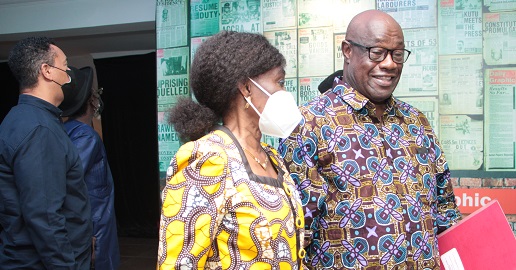
June 4 anniversary marked with photo exhibition
The Jerry John Rawlings Foundation has marked the 43rd anniversary of the ‘June 4, 1979 uprising’ with a theatre performance and photo exhibition in Accra.
The solemn occasion, held at the Ghana Academy of Arts and Science auditorium last Saturday night, was used to remember and celebrate the life and works of former President Jerry John Rawlings, who led the ‘1979 uprising’.
Advertisement
The exhibition, a collection of rare and known photographs taken during the 1979 revolution, which captured the period he served as head of state and later President, from 1993 to 2001, and others taken after, brought a mixture of emotions and memories to patrons of the event.
Press cuttings
It also included press cuttings from the Daily Graphic over a period of three decades which showcased the achievements of the late President Rawlings, his meetings with world leaders and persons of global influence and events that led to the country’s return to democratic rule in 1993.
The curation, managed by politician Fritz Baffour, offered not just a glimpse into the eventful life of the man who governed as head of state for almost two decades but also portrayed his ideals and service to the country.
A documentary of his speeches at national and private events, in which he was critical of corrupt practices and shared his views on various topics, were also screened as part of the occasion.
The well-attended event brought together the family of the late President, including his wife, Nana Konadu Agyeman-Rawlings, his children, Dr Zanetor Agyeman-Rawlings, Kimathi Rawlings, Yaa Asantewaa Rawlings and Amina Rawlings.
Also in attendance were members of the National Democratic Congress (NDC) and former government officials such as E.T Mensah, Dr Benjamin Kumbour, Dr Kwabena Duffour and Nii Lante Vanderpuye.
In a welcome address, Ms Yaa Asantewaa Rawlings said the exhibition and theatre performance would contribute to the historical chronicle of the uprising and historical moments in Ghana’s history that led to the ‘uprising’.
The event, she said, offered an opportunity for interaction and discourse, and also served as an academic exercise, particularly in the fields of research, history, politics, and African studies.
Revolution
A statement from the Foundation stated that the trying political and economic circumstances at the time led to social unrest which culminated in what had come to be known as the uprising of June 4, 1979.
“That action had first been preceded by a failed mutiny of May 15, 1979,” it stated.
“June 4, 1979, was a spontaneous reaction. The theatre performance hopes to relive the circumstances of the uprising and help to better chronicle the occurrences of the period,” it stated.



